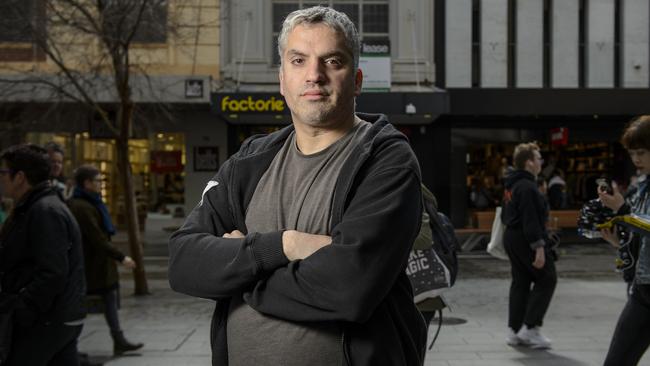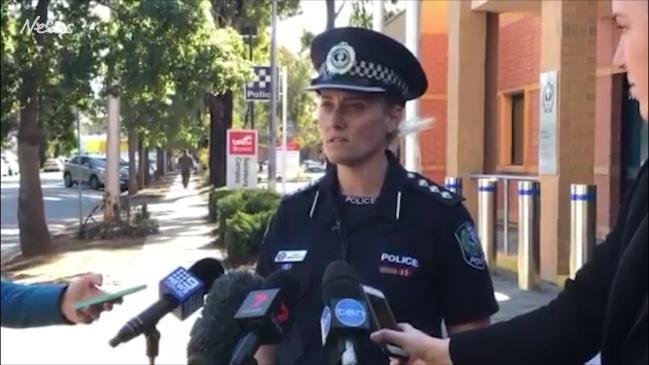Adelaide cleaner to speak to Senate inquiry into exploitation in contracted cleaners’ industry
A CLEANER for more than 20 years, Arthur Tsimopoulos hasn’t had a payrise in the past four. In an industry rife with low wages, injury and sham contracting, he’s going to the top, speaking at a Senate inquiry into the exploitation of contract cleaners.

SA News
Don't miss out on the headlines from SA News. Followed categories will be added to My News.
SOUTH Australian contractors are being taken to the cleaners — subjected to low wages, physically tough conditions and sham arrangements.
Surrey Downs father Arthur Tsimopoulos, 40, has worked as a cleaner for more than two decades and has seen the filthy side of the industry where vulnerable workers are exploited.
Mr Tsimopoulos has been employed as a casual, permanent part-time and now full-time worker — which he says is “very rare” — where he is paid just $21.17 an hour and has not had a pay rise in the past four years.
Not even the job or entitlements are secure with the contract to clean an Adelaide CBD shopping centre including food court, offices, toilets, and fire stairs up for tender next year.
He said the months leading up to the three-year contracts ending was a “daunting” time for his family.
“I lose a lot of sleep, I wake up in the middle of the night thinking ‘am I going to have enough hours to pay for things, am I still going to retain a job’,” Mr Tsimopoulos said.
Along with that, he loses any long-service, sick and annual leave that was accrued.
“It takes a toll stress-wise,” he said.
A physically demanding profession, Mr Tsimopoulos has had muscle strains, minor accidents and said “you cop abuse all the time”.
He said cleaners take pride in their work but their conditions could be improved by increasing wages and an industry fund being established to retain the leave they accrue.
Mr Tsimopoulos will share his experience at a Senate inquiry into exploitation of contract cleaners on Tuesday in Melbourne.
The inquiry will also hear evidence about workers who have been the victim of sham contracting arrangements — where an employer attempts to disguise the employment as an independent contractor to avoid paying entitlements — and long hours being underpaid and without penalty rates.

In a submission to the inquiry, union United Voice also states that a South Australian cleaner at Harris Scarfe Rundle Mall and Adelaide Airport was underpaid almost $170,000 between 2010 and 2014 while working as a franchisee for cleaning contractor Academy Services.
“As a ‘franchisee’, our member was paid a flat rate of $27.76 per hour, out of which he had to pay 25 per cent as a ‘franchisee royalty’ and 7.5 per cent as ‘Work Cover Levy’,” the submission states.
United Voice SA branch secretary David Di Troia said the cleaning industry needed an overhaul.
“Many companies contract and subcontract work to such an extent that there is no accountability for the working conditions of cleaners,” Mr Di Troia said.
“The only way to change the industry is by putting rules in place for cleaning companies that they have to follow.”
A Fair Work Ombudsman report investigating cleaning in Tasmanian supermarkets released this year raised concerns about the vulnerability of workers — about a third in Australia were contractors.
NSW Senator Doug Cameron said more than 50 per cent of retail cleaners were migrants who often had their visas threatened if they complained about wages and conditions.
He said the inquiry has so far found that contractors working for large retailers are setting up multiple sham subcontracting companies to hide their noncompliance with workplace laws and awards.
“It is clear that the industrial laws are not strong enough to protect some of the most vulnerable workers in our country,” he said.
Taking it to the Senate
The inquiry into exploitation of cleaners working in retail chains for contracting or subcontracting cleaning companies will tomorrow in Melbourne hear evidence from union groups, lawyers and labour experts.
What has happened?
Across Australia contract cleaners have been subjected to wage theft, underpayment, no pay rises, and workplace injuries.
Often they are migrants, and submissions suggest they have had their visas threatened if they complain about conditions.
University of Adelaide Law School Professor Andrew Stewart, in a joint submission, wrote that compared to other countries, Australia has an exceptionally strong safety net of rights and protections for employees.
“But the very strength of that safety net creates incentives for businesses to find ways of minimising or avoiding the costs associated with complying with the employment standards framework,” he wrote.
This is evident in the industry’s pyramid subcontracting schemes that allow companies to avoid obligations including payroll tax.
What can be done to improve conditions for workers?
Industry, union and academic submissions to the inquiry suggest that greater government support is needed and its relationship with unions needs to be strengthened to ensure workers have adequate representation and knowledge of their rights.
Recommendations also include extending the Cleaning Accountability Framework — an independent and industry-led initiative to improve conditions.
Originally published as Adelaide cleaner to speak to Senate inquiry into exploitation in contracted cleaners’ industry



